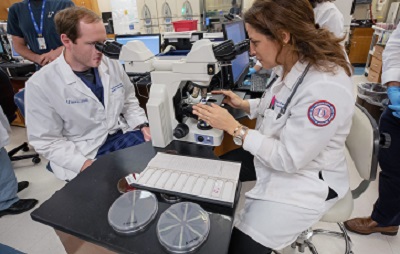About the Division
- Department of Medicine
- About Department of Medicine
-
Specialties
- Cardiology
- Clinical Immunology
- Digestive Diseases
- Endocrinology
- General Internal Medicine
- Geriatrics
- Hematology and Oncology
- Hospital Medicine
- Infectious Diseases
- Nephrology
- Palliative and Supportive Care
- Pulmonary, Critical Care and Sleep Medicine
- Genetics and Genomics
-
Education Programs
- Student Programs
-
Internal Medicine Residency Program
- Internal Medicine Residency Program Home
- About the Program
- Residents
- Applicants
- Social Media
- Medicine/Pediatrics Residency Program
- Fellowship Programs
- Board Review Course
- Research
Research
 Infectious Diseases, a division of the UMMC Department of Medicine, has many ongoing research initiatives involving various infectious diseases throughout the state and country. Many of our efforts are collaborative with other departments and institutions. An example of one of our ongoing research projects is highlighted below.
Infectious Diseases, a division of the UMMC Department of Medicine, has many ongoing research initiatives involving various infectious diseases throughout the state and country. Many of our efforts are collaborative with other departments and institutions. An example of one of our ongoing research projects is highlighted below.
MACS/WIHS Combined Cohort Study (MWCCS)
- MWCCS is a longitudinal prospective cohort study of men and women living with HIV and at risk for HIV, at UMMC starting in 2013; funded by NHLBI starting in 2019
- MACS
- Started in 1983 and has enrolled more than 7000 men who have sex with men (MSM) over the years; they are currently following about 4500 MSM in Pittsburg, Baltimore, Chicago, and Los Angeles
- WIHS
- Started in 1993 and has enrolled more than 5,000 women over the years; they are currently following about 4,500 women, 850 of which are from the Southern sites which started in 2013. Sites include Washington, D.C., two sites in New York City, Chicago, San Francisco, and a legacy site in Los Angeles; the Southern sites include Atlanta, Chapel Hill, NC, Miami and a joint site in Birmingham, AL, and Jackson.
- Identify biomarkers of increased risk for chronic disorders in people living with HIV.
- Determine how antiretroviral therapy (ART) affects other medical conditions, including the timing of treatments after HIV infection.
- Develop strategies for more effective interventions and treatments.
- Learn about the role of chronic immune activation and inflammation due to HIV infection in other health conditions.
- Study HIV as a possible research model for accelerated aging.
Investigators from the previously separate MACS and WIHS studies have made groundbreaking discoveries in the field of HIV research, including how best to diagnose and manage HIV; the link between low immune cell counts and AIDS; and genetic, metabolic, and other factors that influence how HIV infection may progress to the active diseases of AIDS.” - MACS/WIHS Combined Cohort Study quote
The UAB and UMMC sites each enrolled 115 in 2013-15, and each plan to enroll 100 men > age 30 starting in 2020.
- To use data and/or specimens, contact the UMMC PI, Dr. Deborah Konkle-Parker at (601)984-5553 or email.


